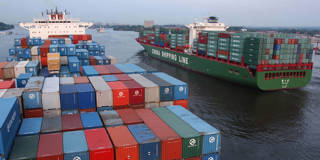Seven decades ago, Mao Zedong embraced economic self-reliance and foreign-policy militancy, which turned China into an impoverished pariah state. This history should be a stark warning to President Xi Jinping: if he allows Russia to divide the world with its war on Ukraine, it is China that will pay the heaviest price.
CLAREMONT, CALIFORNIA – Russia’s unprovoked war against Ukraine has accelerated the division of the world into two blocs, one comprising the world’s democracies, and the other its autocracies. This, in turn, has exposed the risks inherent in economic interdependence among countries with clashing ideologies and security interests. And although the coming deglobalization process will leave everyone worse off, China stands to lose the most.
Of course, China was headed toward at least a partial decoupling with the United States well before Russia invaded Ukraine. And it has been seeking to ensure that this process happens on its terms, by reducing its dependence on US markets and technology. To that end, in 2020 China unveiled its so-called dual-circulation strategy, which aims to foster domestic demand and technological self-sufficiency.
And yet, last year, China was still the world’s largest exporter, shipping $3.3 trillion in goods to the rest of the world, with the US its leading export market. In fact, overall trade with the US grew by more than 20% in 2021, as total Chinese trade reached a new high. Trade with the European Union also grew, reaching $828 billion, even as disagreements over human rights torpedoed a controversial EU-China investment agreement.

CLAREMONT, CALIFORNIA – Russia’s unprovoked war against Ukraine has accelerated the division of the world into two blocs, one comprising the world’s democracies, and the other its autocracies. This, in turn, has exposed the risks inherent in economic interdependence among countries with clashing ideologies and security interests. And although the coming deglobalization process will leave everyone worse off, China stands to lose the most.
Of course, China was headed toward at least a partial decoupling with the United States well before Russia invaded Ukraine. And it has been seeking to ensure that this process happens on its terms, by reducing its dependence on US markets and technology. To that end, in 2020 China unveiled its so-called dual-circulation strategy, which aims to foster domestic demand and technological self-sufficiency.
And yet, last year, China was still the world’s largest exporter, shipping $3.3 trillion in goods to the rest of the world, with the US its leading export market. In fact, overall trade with the US grew by more than 20% in 2021, as total Chinese trade reached a new high. Trade with the European Union also grew, reaching $828 billion, even as disagreements over human rights torpedoed a controversial EU-China investment agreement.